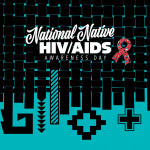I am at a loss for how to lead during what could be some of the difficult days. Six hundred thousand new cases of COVID per day. Too many friends are sick but luckily most are OK because they are vaccinated and boosted. It feels like everyone is going to get the Omicron. I remember that feeling during the early days of the AIDS epidemic. As a young gay man watching too many of my friends get sick and die, AIDS felt inevitable. It was only a matter of time. Yet we didn’t give in, and we learned to fight back. What does COVID mean for the HIV community? How does our work fit into this new reality? How do you lead and work to end the HIV epidemic in the middle of the latest surge?
Here is what I am telling my staff: Scientists predict that the next few weeks will be some of the most difficult times we’ve experienced, with new cases regularly passing over one million per day. Personally, I think it’s impossible to get the real numbers because it is too difficult to get the necessary confirmatory tests. Between people who are vaccinated and people who got COVID, America might reach some type of “herd” immunity; however, that assumes there won’t be another variant. Right now, it is impossible to know what the virus will do.
Experts say that March could be the return to normal, but they also said that about the summer of 2021. This uncertainty makes everything difficult. Our movement needs a short-term strategy to manage the immediate challenges and a longer-term strategy that looks at ending HIV. In the short-term there is going to be lots of sickness, but hopefully not as many deaths. The HIV community must prioritize the health and wellbeing of people living with HIV, especially PLHIV over 50 who are immune compromised. It is impossible to know how many PLHIV are vaccinated. By my very imperfect calculations, if there are 1.2 million Americans living with HIV. 49% are either unaware of their HIV status or have fallen out of HIV care or around 600,000 people. That’s a lot of immune compromised people who may or may not be vaccinated. COVD disproportionately kills older Americans and the majority of people living with HIV are over 50.
In the short term that means everyone who is eligible needs to not only be vaccinated, but also boosted. That is the best defense we have against COVID. We may need a fourth booster, particularly for people who are immune compromised. NMAC will always follow the science. It’s time for health departments and community-based organizations to actively reach out to all consumers to ensure that they are appropriately vaccinated. We cannot wait for PLHIV to come to us. We need to go to them while also being sensitive to privacy and confidentiality concerns.
As we have learned with HIV, COVID isolation can lead to a sense of helplessness and depression. When you are sick or depressed it is hard to do anything, let alone take your meds.
In addition to boosters, our movement needs mental health check-ins. While we are zoomed out, one of the things I noticed at this year’s United States Conference on HIV/AIDS was the active participation of PLHIV in various lounges that the meeting offered. Like we’ve done in the past, there needs to be regular support groups (via Zoom) and virtual buddy programs that build connections and a sense of purpose.
PLHIV need access to technology to zoom for virtual medical appointments, and to connect with their case managers and peers. How can health departments and community-based organizations provide free access for clients? Because of COVID and the challenges of staying six feet apart, access to technology is not a luxury, but a necessity. The standard of HIV care needs to be expanded to include these lifesaving tools. If housing is HIV prevention, then so too is an iPad and internet connection.
The short term is all about boosters, mental health check-ins, and access to technology. The longer term (hopefully later this year) is still about ending the HIV epidemic. Work to end the HIV epidemic starts with reading the plan. If you don’t know what is in the plan, it’s hard to be part of the solution. Here is an insider’s piece of information: the White House will meet with various federal offices to ask for their responses to the Ending the HIV Epidemic and the updated National HIV/AIDS Strategy. Updated agency plans will be due in March. NMAC in coalition with other national partners will request meetings with the various federal agencies to discuss their updated plans. There are many new and important components that need to be appropriately reflected in these agency’s plans.
I am very concerned about the next few weeks. I worry about our physical well-being and our long-term mental health. WTF 2022. I hoped it would get better, now it just seems like a cluster f**k. What I’ve learned from HIV is that we are stronger together. During these very difficult times, it is important to remember that kindness is free.
Yours in the Struggle,
Paul Kawata








Comments
Comments